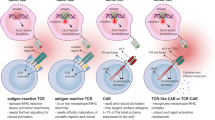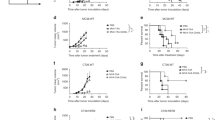Abstract
Adoptive immunotherapy involving the transfer of autologous tumor or virus-reactive T lymphocytes has been demonstrated to be effective in the eradication of cancer and virally infected cells. Identification of MHC-restricted antigens and progress in generation of adaptive immune responses have provided new direction for such treatment for severe pathologies such as cancer and autoimmune diseases. Here we review the latest development about the molecular basis of MHC-I/TCR interaction, and its manipulation including enhanced MHC-I expression, modification of peptide and engineered TCR for clinical applications such as vaccine design, tumor therapy and autoimmune diseases.
This is a preview of subscription content, access via your institution
Access options
Subscribe to this journal
Receive 12 digital issues and online access to articles
$119.00 per year
only $9.92 per issue
Buy this article
- Purchase on Springer Link
- Instant access to full article PDF
Prices may be subject to local taxes which are calculated during checkout
Similar content being viewed by others
Author information
Authors and Affiliations
Corresponding author
Rights and permissions
About this article
Cite this article
Liu, Q., Gao, B. Manipulation of MHC-I/TCR Interaction for Immune Therapy. Cell Mol Immunol 5, 171–182 (2008). https://doi.org/10.1038/cmi.2008.21
Received:
Accepted:
Issue Date:
DOI: https://doi.org/10.1038/cmi.2008.21
Keywords
This article is cited by
-
Memory T cells: strategies for optimizing tumor immunotherapy
Protein & Cell (2020)
-
Decreased MHC I expression in IFN gamma mutant mice alters synaptic elimination in the spinal cord after peripheral injury
Journal of Neuroinflammation (2012)



